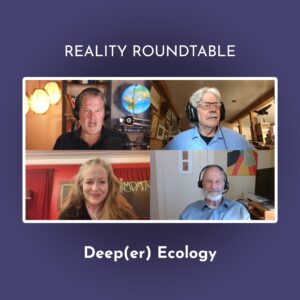
Show Summary
On this segment of Reality Roundtable, Nate is joined by William Rees, Nora Bateson, and Rex Weyler to discuss the purpose of ecology and what it might look like to have a civilization centered around it. Despite our tendency to think of ourselves as separate from the biosphere, humans are a part of it, just like any other animal. What sets us apart now is our outsized impact on the world around us, as we and our societies take up more space and resources, degrading the ecosystems that support ourselves, our descendants, and other species. How can an understanding of systems and relationships help us rethink how we interact with the planet? Could ecologically literate governments and citizens create wider boundaries across time and space in which decisions are made? What might the parameters be for a civilization centered around ecology, and how can we navigate there through declining energy and resource availability? Most of all, how can we as individuals and communities root ourselves into a deep(er) ecological knowledge and way of being?
About Nora Bateson
Nora Bateson is an award-winning filmmaker, writer and educator, as well as President of the International Bateson Institute, based in Sweden. Her work asks the question “How can we improve our perception of the complexity we live within, so we may improve our interaction with the world?”.
An international lecturer, researcher and writer, Nora wrote, directed and produced the award-winning documentary, An Ecology of Mind, a portrait of her father, Gregory Bateson. Her work brings the fields of biology, cognition, art, anthropology, psychology, and information technology together into a study of the patterns in ecology of living systems. Her book, Small Arcs of Larger Circles, released by Triarchy Press, UK, 2016 is a revolutionary personal approach to the study of systems and complexity.
About William Rees
William Rees is a population ecologist, ecological economist, Professor Emeritus and former Director of the University of British Columbia’s School of Community and Regional Planning in Vancouver, Canada. He researches the implications of global ecological trends for the longevity of civilization, with special focus on urban (un)sustainability and cultural/cognitive barriers to rational public policy. Prof Rees is best known as the originator and co-developer with Dr Mathis Wackernagel of ‘ecological footprint analysis’ (EFA), a quantitative tool that estimates human demands on ecosystems and the extent to which humanity is in ‘ecological overshoot.’ Dr Rees is a founding member and former President of the Canadian Society for Ecological Economics; a founding Director of the OneEarth Living Initiative; a Fellow of the Post-Carbon Institute and an Associate Fellow of the Great Transition Initiative.
About Rex Weyler
Rex Weyler is a writer and ecologist. His books include Blood of the Land; the Government and Corporate War Against First Nations, nominated for a Pulitzer Prize; Greenpeace: The Inside Story, a finalist for the BC Book Award and the Shaughnessy-Cohen Award for Political Writing; and The Jesus Sayings, a deconstruction of first century history, a finalist for the BC Book Award.
In the 1970s, Weyler was a cofounder of Greenpeace International and editor of the Greenpeace Chronicles. He served on campaigns to preserve rivers and forests and to stop whaling, sealing, and toxic dumping.
He currently posts the “Deep Green” column at the Greenpeace International website. He lives on Cortes Island in British Columbia, with his wife, artist Lisa Gibbons.
In French, we have a motto that says that a simple drawing is often better than a long explanation. Jean-Marc Jancovici Carbone 4 President
That’s very understandable because with left atmosphere thinking, one of the problems is that you see everything as a series of problems that must have solutions. Iain McGilchrist Neuroscientist and Philosopher
We can’t have hundreds and hundreds of real relationships that are healthy because that requires time and effort and full attention and awareness of being in real relationship and conversation with the other human. Nate Hagens Director of ISEOF
This is the crux of the whole problem. Individual parts of nature are more valuable than the biocomplexity of nature. Thomas Crowther Founder Restor
Show Notes & Links to Learn More
Download transcript00:00 – Nora Bateson’s Warm Data and TGS Episode, William Rees’ works and TGS Episode, Rex Weyler’s Deep Green essays index and TGS Episode
01:58 – Ecology
04:18 – Emergence
05:12 – Dissipative Structures (Section 1.3)
07:59 – Endosomatic/exosomatic energy
10:04 – Bio-semiotics
12:50 – 1st Order, 2nd Order, Nth order
14:01 – Moth camouflaged as birds of prey
17:27 – Copernican Revolution
18:51 – Rachel Carson Silent Spring
19:28 – Taoism
20:08 – Divine Efficacy
21:05 – Humans and livestock are taking up 96% of space on Earth
25:17 – Sierra Club
27:00 – Mental models and human constructs
28:10 – A repeated concept forms synaptic circuits that block out competing information
30:27 – Microbiome, Mycelia and Tree relationships
31:52 – Charles Sanders Pierce
32:45 – Humans have more bacterial cells than their own cells
37:32 – Overshoot
40:26 – Daniel Schmachtenberger TGS Episode
46:26 – Map is not the territory, Korzybski
47:21 – Negative and Positive Feedbacks
47:30 – The fossil abundance has provided the resource for human population to explode
48:32 – Circular Economy
50:47 – Esalen Community
53:22 – Redundancy
56:52 – Contraction of the human species is inevitable
1:01:30 – Energy consumption 100 years ago
1:03:45 – Declining fossil fuel accessibility
1:04:35 – Ways to ethically and slowly decline global population
1:09:25 – Eugenics
1:11:59 – Stephen Gaskin
1:14:03 – British Columbia made all contraception completely free
1:14:50 – Pro-Natalists
1:20:20 – Russo-Ukraine War risks
1:21:10 – Nuclear Fallout risks
1:25:31 – Laws of Thermodynamics
1:25:36 – The Arrogance of Humanism
1:28:25 – Tautology




